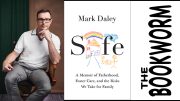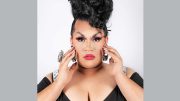
Mary Lambert released a solo EP “Welcome to the Age of my Body.” Her hit with Macklemore “Same Love” propelled the artist on Grammy night.
Photos: Mike Ruiz
By: Chris Azzopardi*/Special to TRT—
“I’m not crying on Sundays,” Mary Lambert assures herself on the song that got her to the Grammys. But this Sunday was different. This Sunday was better.
Singing the heart-lifting chorus to Macklemore’s “Same Love,” which was nominated for Song of the Year, Lambert made her Grammy debut on Jan. 26.
That’s when she lost it. But these weren’t tears of sadness or shame. These were tears of joy. Tears of being inspired and moved and all those things you feel when you share the stage with gay couples who are finally able to get married, a monumental celebration that took place at the awards show, with Queen Latifah officiating.
Emotions ran high that night, but Lambert, 24, had a new friend nearby – a new friend by the name of Madonna. And the icon didn’t just sing Lambert’s words, but, like something out of a fever dream, swooped in and wiped away her tears.
Lambert, who just released her own solo EP called Welcome to the Age of My Body, was still emotional when she spoke about that unforgettable night.
Chris Azzopardi: You must be pinching yourself. What was your Grammy experience like?
Mary Lambert: It was really emotional from start to finish. I already feel like Cinderella because I was bartending last year and didn’t know how I was gonna pay rent. Now I’ve been nominated for a Grammy – and I took my mom, which was a dream of mine – but then to be able to do this song, and to do it on this magnitude with this beautiful choir and fucking Madonna and Queen Latifah, are you kidding me? It’s just stupid, dude. If I really think about it, I lose it.
Q. You cry?
A. Yeah, like, “I don’t deserve this.” I’m still working on my positive self-talk. (Laughs)
Q. What was it like being part of the wedding ceremony?
A. Honestly, that was the most emotional part. Being in rehearsal and hearing Madonna sing my words and hearing the choir come in, that was emotional, but being in the dress rehearsal at the Grammys and watching the couples come in, I couldn’t get through the song for almost every rehearsal. I wasn’t sure how I was gonna perform because it was so beautiful. You saw on their faces how much it meant to them, and I knew how much it would mean to the viewer. How do you process that? It’s the most beautiful thing that exists in the world.
Q. What were rehearsals with Madonna like?
A. We had long rehearsals – and I wouldn’t say we’re close, but we got to know each other’s mannerisms and how we operate. I consider her a friend. She was very kind to me, and because we had to work together, I had to be like, “Hey, this is how I sing the song.” (Laughs)
Q. Is it weird telling Madonna how to sing?
A. Uh yeah! Everybody froze when I was like, “Hey, Madonna, do you think you could try singing it like this – the way I sing it?” (Laughs)
Q. Were you at all intimidated by that?
A. I was a little shaky when I first met her because her entourage came in and she said, “I’m Madonna.” But, I think it was during dress rehearsal, she had her leather gloves on and I’m sobbing watching these people who are about to exchange their vows and she leans over – and she’s wiping the tears from my face with her leather gloves and looking at me! I’m like, “What the fuck is my life?” Like, what do you do? You just let Madonna wipe your tears, that’s what you do. (Laughs)
Q. Your first performance was when you were a kid, for a gaggle of Beanie Babies. What’s it like performing for real people?
A. It’s how it should be! I feel like I was made to be a performer and I just depend so much on the energy – like, warm, breathing bodies. (Laughs)
Q. You struggled with your sexuality when you were a teenager. And, really, in many ways you epitomize the “it gets better” story, don’t you?
A. Yeah, but I had a really amazing support system. The conflict was not external; the conflict definitely had to do with reconciling my faith and my sexuality. There was no enemy, you know?
Q. Just yourself?
A. Yeah. When I was a kid, I wanted to be in love so badly. It was more of this obsession with being in love, and so I always had a boyfriend, but I knew that I found girls much more physically appealing. Honestly, everything that I thought I was is how I thought everybody else felt. I thought that other girls would try to make out with their friends too! (Laughs) I just thought that was something that girls did – that they fantasized about boobs! I just thought that was a thing. I thought everybody preferred to be with women, but the weird thing is that my mom is gay so it’s not like it wasn’t OK. It just didn’t occur to me that I could be that way. I questioned it a lot. Like, “I think I could see myself having sex with a woman” – and this is me at 12 years old saying these things. (Laughs) I was highly analytical.
Q. At 12 years old?
A. Yeah! (Laughs) I’ve always been sure of who I am. In high school, there was one bi girl who was like, “I date girls.” I was like, “You can date girls and that’s OK?”
The real turmoil of it happened when I was 18 or 19. I was attending an Evangelical church and I met this girl and I was in love with her. I wanted to be with her but I didn’t want to sin.
Q. How was writing cathartic for you at that time in your life?
A. That was everything to me. It was the only way I could have gotten through it. I discovered spoken word around the time I came out, maybe two years afterward, but about the peak of my suicide attempt is when I wrote my first poem. It was about being conflicted about the Christian church and being gay and how difficult that was. Poetry really got me out of it.
Q. How does it feel to sing “I’m not crying on Sundays,” then, during the chorus of “Same Love”?
A. It’s so empowering. It’s the most empowering thing. It feels like a declaration for me, but I also know that it’s so many other people’s stories. I think that’s what makes me feel so strongly about it. Not that the gay community is silenced and I’m speaking for them, but like I can be an advocate. I really just wanted to bring a universal truth to the song rather than politicize (the issue) any more than it’s already become.
The biggest declaration for me is definitely saying “I’m not crying on Sundays.” I spent every Sunday for a year crying in church. It was just guilt and so much shame, and so for me that’s a declaration, like, “Fuck shame, I’m not sorry, I’m not apologizing for who I am.” I’m not gonna cry anymore about being oppressed.
Q. Was the chorus of “Same Love” written about your girlfriend, Michelle Chamuel of The Voice?
A. Umm … that song has seen many different incarnations. It’s been about a series of really great loves that I have had, so I wouldn’t say it’s about anyone super in particular.
Q. Were you surprised to hear the song on the radio?
A. When it first made its debut on the radio it blew my mind, but when it hit hip-hop radio I was like, “Oh, it’s fucking over.”
Q. How does it feel to be a Grammy-nominated artist so early in your career?
A. I’m trying to wrap my head around it. The whole thing just feels like a fluke – and like someone’s gonna take it away. (Laughs)
Q. Are there any plans to work with Macklemore in the future?
A. I would love to. He shot to a place that is bananas, so honestly I just think it’s about timing and scheduling. We both really respect each other as artists, and he’s so supportive of everything I do. We’re buddies, you know?
Q. You’ve done some tour dates with Tegan and Sara. What was it like hanging out with them?
A. I don’t know if Tegan knows this, but maybe it’s just time for it to come out: In all of my previous relationships, Tegan has been that one person who I’m allowed to sleep with. She was my pass.
We were performing “Same Love” for an iTunes show and I’m like, “I am meeting Tegan and Sara today!” They were performing right before us and I was like, “Oh my god, they’re gonna see me perform. I have to make sure my cleavage looks great.” So I’m sitting in the dressing room, which happens to be a bridal suite and so there’s wedding pics everywhere, and I walk in and go, “This is how it happens.” They’re just totally awesome. No makey-outy time, though.
Q. What do you hope to accomplish with Welcome to the Age of My Body?
A. The word I kept telling myself surrounding this album was empowerment. I want to empower myself and empower and mobilize other people with art. If I’m unsuccessful, I’m unsuccessful, but it’s worth trying.
What I hope this record achieves is a sense of vulnerability. I want to be as vulnerable as possible with my audience, because I think there are a lot of issues that I’m working out. It’s more of me opening up and hoping to be held, and then also hoping my voice can encircle a hug.
Q. Because this is mostly a spoken-word album, does it feel like a risk to release it on a major label?
A. I’m f#$@%&ng terrified. I know in my heart what it can do, but there’s no formula for it. I don’t know if it’s been done before. Either it changes something or it totally flops – I don’t know if I’m supposed to say that – but I have faith in it. I have faith in the power of what words can do.
*Chris Azzopardi is the editor of Q Syndicate, the international LGBT wire service. Reach him via his website at www.chris-azzopardi.com.







